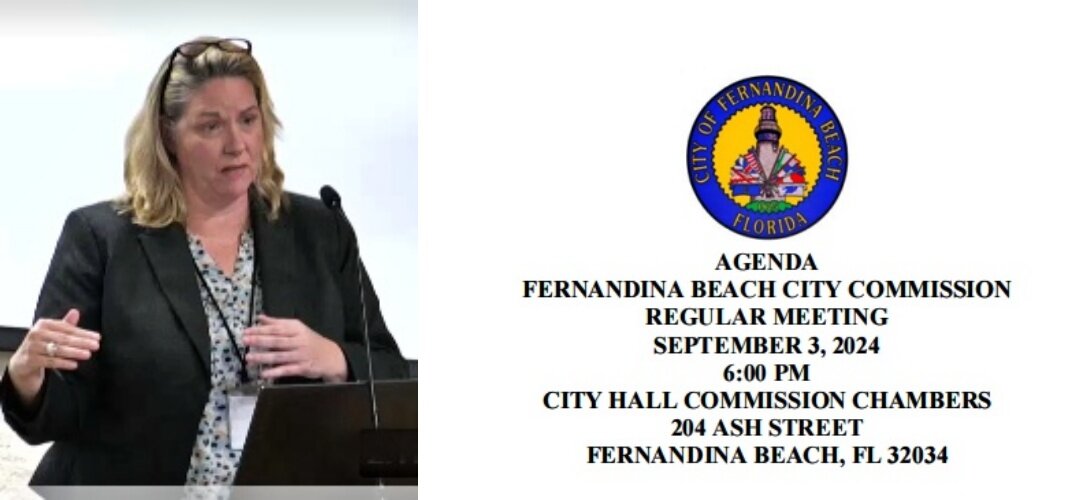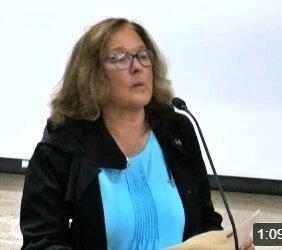City attorney emails doom commission bioethanol talks
Fernandina Beach City Attorney Tammi Bach's emails to city commissioners telling them not to talk about Rayonier Advanced Materials' (RYAM) plans to build a bioethanol production plant has resulted in a discussion about the project being removed from Tuesday's commission meeting.
Bach's emails warning about potential changes in the city's Land Development Code to exclude bioethanol production prompted City Clerk Caroline Best to remove the bioethanol plant as a discussion/presentation item from the agenda.
RYAM is seeking to build a bioethanol plant at its Gum Street complex that would produce 7.5 million gallons of bioethanol a year.
For months, public speakers and several city commissioners have sought to have a discussion about RYAM's plans for bioethanol production in the city. Commissioners James Antun and Chip Ross successfully placed the discussion on the Tuesday agenda, but then came a torrent of emails from the city attorney.
In an email to Commissioner Chip Ross last week, City Clerk Best stated, "At your request, and at the request of one other Commissioner, staff placed a bioethanol discussion item on the Sept. 3 city commission regular agenda meeting, due to City Attorney Bach's legal opinion, that the City should not discuss the matter at this time, the bioethanol discussion item has been removed."
The decision to cancel the bioethanol discussion/presentation has drawn disapproval from opponents of RYAM's effort to produce the alternative fuel in the city. They claim the basis of Bach's emails - the Land Development Code - had nothing to do with their planned presentation.
Fernandina Beach resident Sandy Kerry took city officials to task for issuing the emails that led to bioethanol being scrapped from the meeting.
"It is painfully clear that the city is doing anything and everything to keep discussion of the proposed bioethanol plant from coming forward. We never asked to have RYAM at this meeting, only for us to present issues of concern to the public regarding bioethanol," Kerry said in an email to The Observer. "Ms. Bach’s 'answer' or her 'opinion' regarding a possible comprehensive plan change brought up by Commissioner Ross over two months ago (July 17), had absolutely nothing whatsoever to do with our request. Yet she uses that as the reason she advised Ms. Best to remove the item from the agenda. She also urges no discussion by the commission for the same reason."
The removal of the bioethanol plan from the meeting also drew the ire of Taina Christner of No Ethanol Fernandina, a group opposed to RYAM's efforts to build the production facility.
In an Aug. 21 email to Commissioner Ross seeking an answer as to why the item was pulled from the agenda, Christner wrote, "I was surprised to learn that the citizens' presentation on the proposed bioethanol plant was canceled. This presentation was intended purely for informational purposes and did not involve a request for a comprehensive plan change. The process followed by the citizens was consistent with our procedures: two commissioners separately requested the addition of a short 10-minute item to the September 3 City Commission meeting agenda, which the city clerk subsequently included. It is concerning to me that Ms. Bach, a non-elected staff member, has the authority to remove an agenda item that was endorsed by two elected commissioners."
Christner asked how the city attorney could have removed an item from the agenda.
"Could you please clarify Ms. Bach’s role in this matter? How is it possible for a staff member to override the requests of both citizens and elected officials? I am concerned that this action may undermine the rights of commissioners and citizens, potentially discouraging public participation in our government processes," she said in her email.
The city attorney is a charter officer who reports directly to the city commission. City staff report only to the city manager.
Best emailed this explanation to Kerry, "Charter Officers work collaboratively in the furtherance of effectively serving Commissioners and staff. City Attorney Bach represents the City, as such, one of her responsibilities is to advise Commissioners, Charter Officers, and staff when their actions may have adverse legal effects. Based on Ms. Bach's legal opinion, I removed the bioethanol presentation from the 9/03 City Commission Regular Meeting agenda and subsequently informed Commissioners Antun and Ross of its removal."
A week ago, Bach issued another missive to commissioners regarding RYAM and bioethanol.
Her email to them stated that once RYAM applies for a construction permit to build the bioethanol plant in Fernandina Beach, city staff should treat the application like any other construction proposal.
Last May, the city received a legal opinion from land use experts that RYAM's proposed bioethanol plant would be in violation of the city's Comprehensive Plan and Land Development Code.
"As a follow up to my email last week about discussing bioethanol at a Commission meeting, I want to make sure that I am clear. If and when RYAM or any other entity wishes to apply to the City for a building permit and/or site plan approval for construction, the City must accept the application(s) and process any such application(s) with the same effort and analysis as any other development application," Bach said in the email. "All development applications that come to the city are reviewed and studied by City staff for consistency with the Comprehensive Plan and Land Development Code. All applicants are afforded the same level of due process and review, no matter what the public conversations have been prior to the development application arriving on the desks of City staff."
Once reviewed by the city's departments -- planning and conservation and the building department -- a building permit is not voted for approval by the city commission. The departments have the authority to grant or deny building permits based on their findings.
Ever since the city received its outside legal opinion, Bach has issued a succession of cautionary emails regarding the bioethanol proposal.
Commissioner Chip Ross had sought to amend the city's Comprehensive Plan to specifically ban any bioethanol, along with chemical or petroleum production in the city.
The city commission had placed the bioethanol plant proposal on its Sept. 3 workshop agenda, but that discussion will not take place after Bach had issued two more emails regarding RYAM's plans.
In July, Bach wrote an email to Ross stating, "please consider not recommending changes to the City’s Comprehensive Plan to expressly prohibit “bioethanol” in addition to “chemical or petroleum manufacturing.” Changing the Comprehensive Plan to expressly prohibit “bioethanol” at this time is big legal liability for the City under the Bert Harris Act and potentially federal takings law."
In that email, Bach stated, "Now, that the whistle has been blown with regard to RYAM seeking an air permit from FDEP for a bioethanol plant, the city is aware of RYAM’s interest in constructing a bioethanol plant. We have all watched Nassau County struggle with the Riverstone Bert Harris claims which were eventually settled by the Board of County Commissioners.
Two weeks ago, Bach wrote an email to all commissioners with an opinion that the city should not consider amending the Comprehensive Plan to prohibit a bioethanol plant citing potential legal land mines. She again cited Nassau County's legal struggles with the proposed Riverstone condominium project.
Bach stated said she anticipates RYAM will mount a legal assault to construct the plant, “but we would be wise to leave the current Comprehensive Plan in place to avoid further/easier legal challenges by RYAM.
However, following the legal opinion obtained by the city last May, RYAM said it would continue to pursue the project.
"RYAM looks forward to engaging with the City at the appropriate time to provide additional information regarding the project to demonstrate that the project is an allowable use under the existing Comprehensive Plan and Land Development Code," said RYAM's spokesman Ryan Houck.
Opposition to the bioethanol plant has been widespread not only in the city, but Amelia Island as well.
Sierra Club President Julie Ferreira said in response to the legal opinion, "Citizens have worked hard on this issue. We felt like the City’s Comprehensive Plan was written in black and white with the express purpose to protect the safety and welfare of the community. Today is the day that was verified. The fight isn’t over however, now we have to elect the people who will withstand RYAM’s pressure to change the Comp Plan in the future. We must still remain vigilant."








